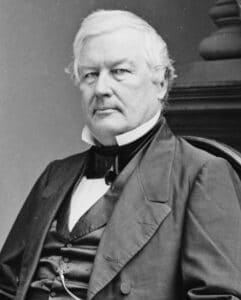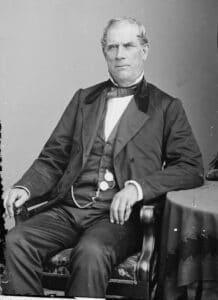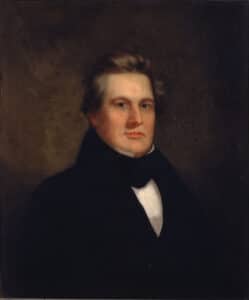Josh Reviews: Millard Fillmore: Biography of a President By Robert Rayback
While it was much easier to find a suitable biography for Fillmore than it was to find the one for Taylor, which still didn’t quite live up to what I expect out of a biography, there were no more choices. Robert Rayback’s 1959 biography of Fillmore is the definitive biography and also just about the only one worth talking about.

Rayback was a history professor in Syracuse, and this seems to be the only book he published – originally intended as a history of the Whig party. It’s probably telling about Fillmore that so little has been written about him – even at the time he was president he was overshadowed by larger personalities in congress. He might have had good intentions, but if Zachary Taylor was the wrong man for the job, Taylor’s understudy should never have been on the bench. Picking Fillmore for the ticket had been an effort at balancing the ticket – Taylor was a southerner, and a lot of whig support was in the north, making the forty-eight year old a solid choice to keep northern votes. Despite Tyler’s ascendance to the presidency, no one actually expected Fillmore to be president.
Fillmore’s actual life aside, I really liked this biography, and for me it proved Fillmore a surprisingly interesting man. After reading Bauer’s Taylor biography (which only barely touched on Fillmore or his relationship to the administration) I wasn’t necessarily expecting much from Rayback, given this book’s age and the lack of scholarship on Fillmore. But I was pleasantly surprised. This is exactly the kind of biography I love to read. It was thorough about his early life without dragging too much (unlike Bauer) and gave me a satisfactory view of the things that formed Fillmore into the politician he became.
Fillmore is rescued from total obscurity in this volume, which optimistically paints him as a devoted unionist who was at times too willing to forgive to be a successful politician. From his beginnings in the Anti-Masonic party to his leadership of the Whig party, the most interesting story told in this biography is of New York state politics, first against Martin Van Buren’s democratic regency and then with the unscrupulous and self-interested Thurlow Weed, who began as a Fillmore friend but would ultimately be an enemy of his administration. Painted as a man searching for political power through the creation of a sectional party, Weed was finally successful in his invasion of the Republican Party in the 1856 election.
Fillmore is not credited with much success. Instead, historians have largely painted him as a man unwilling to offend anyone. That accusation is not entirely without merit, although Rayback paints it in the context of Fillmore’s greatest ideal: keeping the union together. Taylor’s plan to solve the problems of the lands captured in the Mexican War threatened major dissension. Fillmore, on the other hand, was instrumental in passing the Compromise of 1850. The compromise would ultimately be a significant part of what led to the civil war, and it’s hard to know if the compromise itself delayed the war or only added fuel to a pyre that was quickly growing out of control. Just having to renegotiate the Missouri compromise was a sign that things were not as balanced or peaceful as it might have seemed.

Fillmore sought to follow the compromise to the letter. The truth is, though, that the South was the side that was most easily offended, and was on the defensive. This meant that Fillmore spent more time defending the South more than the North, which is why he became the Southern Whig’s choice for president in the 1852 election .
Fillmore’s other presidential achievements were pretty small, but he was a great supporter of trade, and for improvements Buffalo’s canal and trading port especially. Disdaining conflict in the name of expansion, he managed to do very little in pursuit of a canal over the central American isthmus and was against spreading manifest destiny, disowning a crew of Americans who attempted to overthrow the Cuban government. He was also responsible for sending Commodore Perry to Japan (which would, after his presidency, open up trade relations) and successfully opposed European influence in Hawaii as a supporter of Pacific trade.
I think the most telling part of this book, and the greatest defense of Fillmore, was his support as a national candidate in the two elections following his presidency. He was also well-remembered in his hometown in Buffalo, and very supportive of the union throughout the civil war (except for a brief period in 1864 when union morale was at its lowest, when he gave a speech that would hurt him nationally and in the future). But he helped raise money for the effort, organized a ceremonial company of older folks, and provided greatly for a number of societies in Buffalo. This lasting esteem, even if not on a national scale, point to a man who was not quite the failure that history has remembered him as, even if the compromise of 1850 would prove to be a short-lived panacea.

Also well examined in this book is the political infighting in the Whig party. Webster’s desire to be vindicated for his service could have lost Fillmore the 1852 nomination, and Thurlow Weed’s political machinations would serve to have lingering effects on politics in New York and the nation.
That said, it appears to me that any defense of the three presidents prior to Lincoln tends to center on “they were weak because they sacrificed to maintain union” (although it’s pretty hard to argue that for Buchanan). It’s generally true that whatever the biography, the author will seek to prove a thesis that is usually pro-that president (or more rarely anti-) but they often provide enough evidence that it is possible to come to one’s own conclusion. I feel that this biography serves to blow the dust off a bronze (at best) president – and that he was probably a better president than Taylor would have been.

